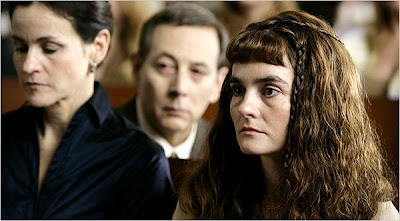
Shades of ‘Happiness,’ Appalling and Funny
Should you laugh or cry? Nearly every scene in “Life During Wartime,” Todd Solondz’s sort-of sequel to his 1998 film, “Happiness,” seems to pose this question, pitching the viewer into a queasy limbo between mirth and anguish. The characters are almost uniformly miserable — the one named Joy perhaps most of all — and whatever joy they do encounter is likely to be short-lived. And yet the painful conversations that make up the bulk of the film’s action are structured like mordant jokes. These people are so clueless, so bad at communication, so ridiculous that they must be suffering for our amusement.
But then again, maybe not. Mr. Solondz’s view of modern American humanity, from “Welcome to the Dollhouse,” through “Happiness” and “Storytelling” and “Palindromes,” has never really changed, though it has yielded uneven results. He is unsparing in his attack on the complacencies of the suburban upper-middle class, but to describe his attitude as cruel or contemptuous is to miss the compassion and the almost rabbinical ethical seriousness that drives his inquiries. And to take a movie like “Life During Wartime” as satire is to simplify its intentions and effects. Mr. Solondz exaggerates in the direction of mockery, yes, but his lurid colors, emphatic musical effects and dead-center framing also betray a commitment to melodrama that can only be sincere.
So as Joy suffers, you suffer along with her. Played by the mousy-voiced, quick-eyed Shirley Henderson (Moaning Myrtle in the “Harry Potter” movies), she is one of three sisters whose quest for contentment, fulfillment and normalcy sits at the center of this episodic exploration of failure and disappointment. Joy, played by Jane Adams in “Happiness,” has married Allen (Michael Kenneth Williams), and the first scene of “Life During Wartime” reconfigures the opening of “Happiness,” in which Ms. Adams and Jon Lovitz sat in an opulent restaurant acting out one of the most painful dates in movie history.
How you experience this scene will depend somewhat on your memory of “Happiness.” In revisiting that earlier film more than a decade later, Mr. Solondz has changed the cast entirely and allowed the characters to age at different rates, so that the events of “Happiness” occupy different phases of each one’s past. (Mr. Lovitz’s character, now a ghost, is played here by Paul Reubens.) Allen (originally played, with indelible creepiness, by Philip Seymour Hoffman) has tried to mend his perverted ways, with Joy’s help.
by A. O. SCOTT
[Source]









0 komentar:
Post a Comment